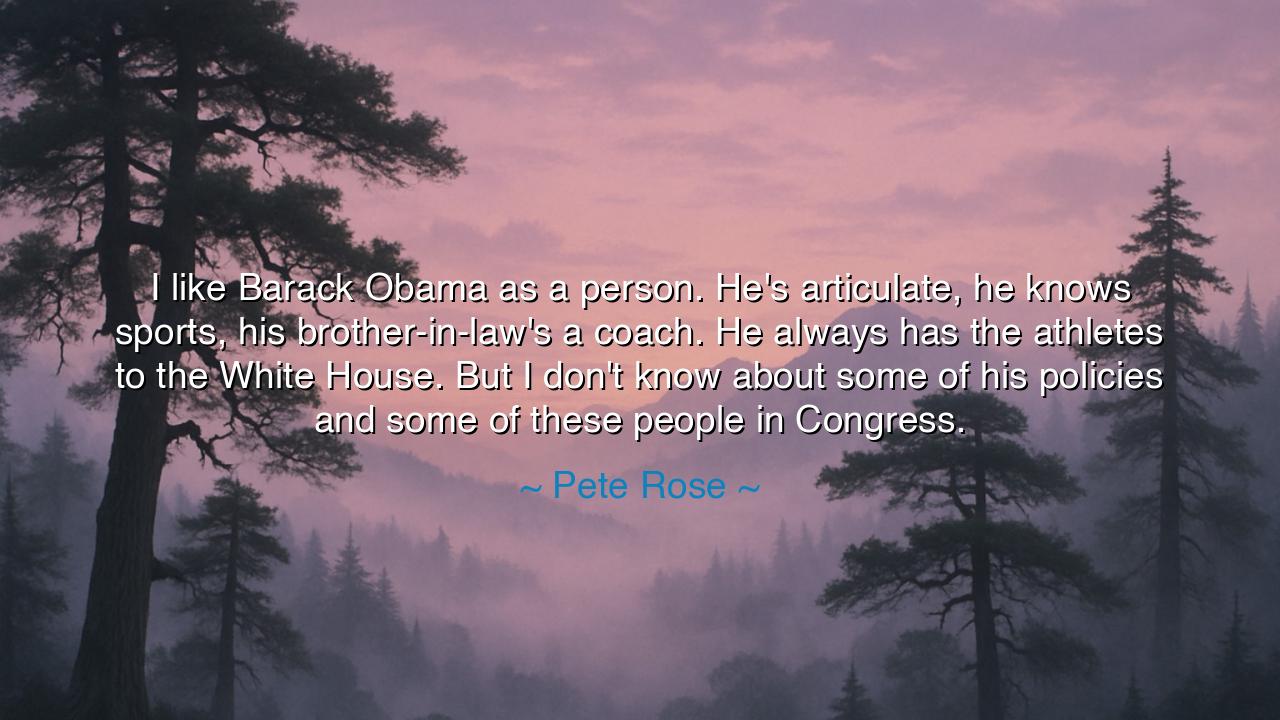
I like Barack Obama as a person. He's articulate, he knows
I like Barack Obama as a person. He's articulate, he knows sports, his brother-in-law's a coach. He always has the athletes to the White House. But I don't know about some of his policies and some of these people in Congress.






In the words of Pete Rose, “I like Barack Obama as a person. He’s articulate, he knows sports, his brother-in-law’s a coach. He always has the athletes to the White House. But I don’t know about some of his policies and some of these people in Congress.” At first glance, this statement may seem casual, even conversational, but within it lies a timeless reflection on the difference between admiration for the individual and doubt toward the systems of power. Rose, a man of the sporting world, honors the humanity he sees in Obama—his warmth, his eloquence, his connection to sports—yet he questions the machinery of governance, the complex realm of policies and political strife.
This quote speaks to the eternal divide between personal character and public office. A man may be virtuous, articulate, and kind, but when seated in the halls of power, he must wrestle with forces larger than himself: political factions, entrenched interests, and the grinding mechanisms of law. Rose’s words echo an ancient truth—that leaders, however noble, are judged not only by their personalities but by the fruits of their governance. To admire the man and question the ruler is no contradiction; it is the honest tension of citizens who love the spirit of their leaders but fear the weight of their decisions.
The ancients knew this paradox well. Consider Marcus Aurelius, the philosopher-emperor. To his friends and to history, he was a man of wisdom, humility, and virtue. Yet even he, beloved for his Meditations, could not fully shield Rome from the corruption of its politics and the chaos of succession. The people admired the man, yet many questioned the outcomes of his reign. Rose’s observation of Obama mirrors this same division: the man may inspire, but the world of Congress and policy is filled with shadows that no personal charm can fully dispel.
There is also a powerful connection here between leadership and sports. By noting Obama’s love of athletics, Rose draws attention to the qualities that sports embody: fairness, competition, teamwork, and resilience. Leaders who understand sports often understand the human heart, for they know the language of struggle and triumph that unites people across divisions. Obama, in welcoming athletes to the White House, revealed his desire to connect leadership with the shared joys and values of the people. Yet Rose reminds us that while sports can inspire unity, politics often breeds division.
Consider the story of Abraham Lincoln. As a man, he was admired for his wit, his storytelling, his kindness. But as president, he faced a Congress and a nation torn in two. Some praised him as a savior, others reviled him as a tyrant. The humanity of Lincoln was never doubted, but his policies were fiercely contested. Here we see again the truth Rose points toward: to admire the man is not always to accept the course of his governance.
The emotional weight of Rose’s words comes from their honesty. He does not attempt to merge admiration and doubt into one seamless judgment; he allows them to exist side by side. This is a mark of maturity in thought: to respect the humanity of a leader while questioning the machinery they command. It reminds us that love for the person does not require blind loyalty to their politics.
So, O listener, let this be your teaching: learn to separate the man from the system, the character from the policies. Honor what is good in people, even if you disagree with their decisions. Speak with respect, even in dissent. For the world is torn apart when admiration and criticism cannot dwell together. True wisdom is to embrace both: to value the person while striving for justice in the realm of governance.
Therefore, take this counsel into your own life: when you look upon leaders, friends, or even rivals, do not judge them by one measure alone. Celebrate their humanity, honor their virtues, but weigh their choices carefully. In doing so, you will see more clearly, act more justly, and live with the balance of one who understands both the greatness and the frailty of those who walk the path of power.






AAdministratorAdministrator
Welcome, honored guests. Please leave a comment, we will respond soon